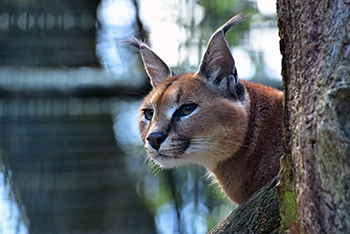
Predators, including caracal and foxes, are costing the
livestock industry about R2 billion annually. The
Predation Management Information Centre was
established to collect, analyse, and make information
available on predation and predation management to
stock and game farmers.
Photo: Pixabay
Predators are costing the livestock industry about R2 billion annually. To address the problem, the Department of Animal, Wildlife and Grassland Sciences at the University of the Free State (UFS) teamed up with the Predation Management Forum (PMF).
Predation Management Information Centre established
The UFS has signed service agreements for the establishment of a Predation Management Information Centre with the four industries (wool, mohair, red meat, and game industries) forming part of the PMF. The centre will collect and analyse information on predation and predation management. This information will then be made available in a management information system and information contained in the system will be made available to all users.
Centre makes essential information available
At the information centre, a team of dedicated staff members handles calls and enquiries. Experts in the team are also available to provide advice to farmers. Furthermore, the centre is responsible for the management of information and resources. Relevant policy documents and scientific articles will be stored in an archive at the centre which will also collect research, statistics, biometric information, and information on new research topics.
The information that is collected will be used to assist farmers with predation management. Information on methods which are effective in a specific situation will be made available to farmers in order to help reduce predation on their farms. “By focusing on non-lethal methods in predation management, best practices can be compiled in order to restrict losses attributed to predation to the minimum,” says Quinette Kruger from the information centre.
Contact details for authorities and specialists managing damage-causing animals will also be provided by the centre.
The information centre invites stock farmers, game farmers, the general public, retail, authorities, and other stakeholders to contact the centre at +27 51 401 2210 or PredationMC@ufs.ac.za.
Read more about the ALPRU project.